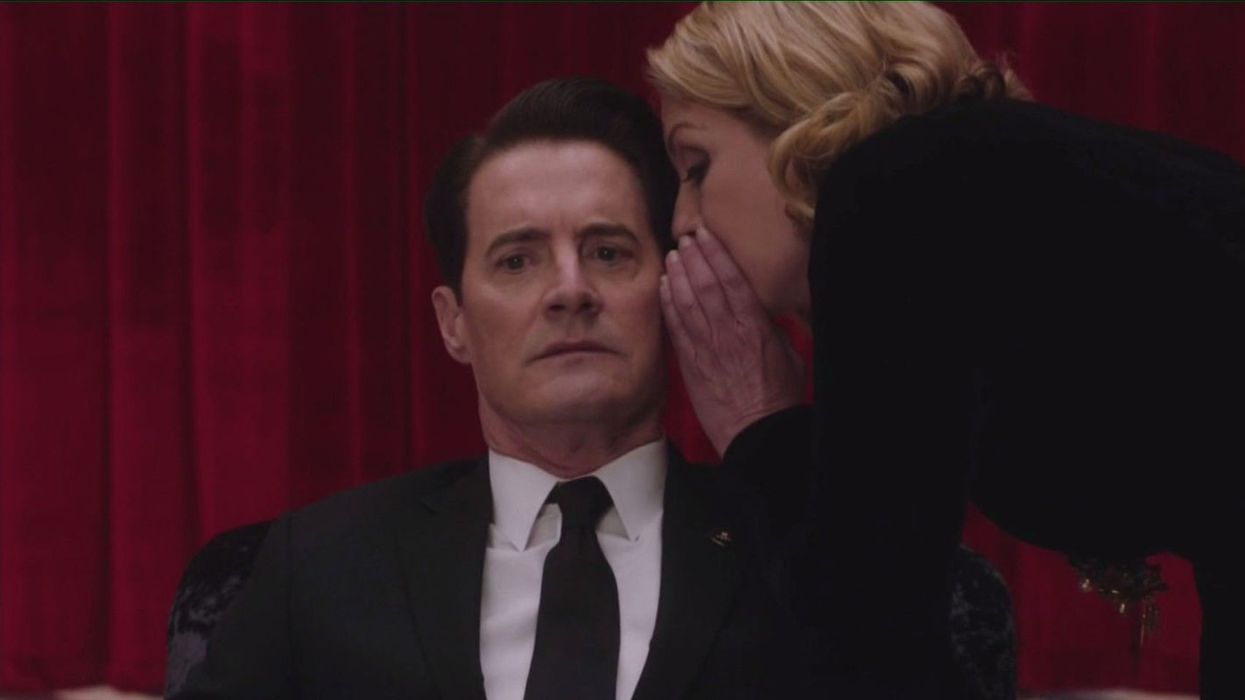Watch: Why You Should Study 'Twin Peaks: The Return' if You Want to Experiment with Time
Nolan and Tarantino took a cue from Lynch. Would you?

More than perhaps any other creative medium, film enables narrative time travel. Immediately, and without any preamble, a story can jump from its present back into its past or fast-forward into its future, and usually viewers simply accept it, often enjoying it. In fact, it would be difficult to think of any film that doesn't expand or contract time in some way, with jumps from scene to scene or from one character's perspective to another.
Lynch continually adjusts and re-adjusts our sense of time, to disorienting but also enlightening effect.
Some directors have historically played with time frames in a self-conscious way, making sure we know time is being manipulated, and the effect of this sort of open switching and flip-flopping is usually the deepening and broadening of the film's symbolism. Christopher Nolan did this to memorable effect in Memento. Quentin Tarantino changed American film by doing it in Pulp Fiction.
And yet the modern master of them all, in terms of his time-manipulation, would have to be David Lynch. His films from Blue Velvet onwards continually adjust and re-adjust our sense of a film's time frame, to disorienting but also enlightening effect. His Twin Peaks: The Return is no exception, with its doubles, abrupt narrative leaps, and perpetual jumps back into the past of the original series through Agent Cooper's dream-states.
Lynch's time-play has its roots in years of film history; in their newest video essay for MUBI, brilliant collaborators Cristina Álvarez López and Adrian Martin show the correlations between TP:TR and Samuel Fuller's The Naked Kiss, a film which, disconcertingly like the series at hand, played present events against past ones, merging one with the other, doggedly showing their connection and overlap at every turn. Watching the seamless comparison raises some points which filmmakers in any genre might keep in mind about the possibilities of time-switching and instant recall.
Vaulting through hoops of normal story sequence gives each film more immediacy.
Theme Accentuation
It is possible that, in derailing the conventional flow of a story, you could reinforce its most basic underpinnings. Consider Agent Cooper, for instance. In the Twin Peaks world, he looks forward and backward in time due to his extrasensory gifts—and with the addition of at least one doppelganger in TP:TR, he might now be said to be in two places at once. This reinforces the idea that good and evil exist simultaneously in the world, and that occasionally they are right next to each other.
Similarly, the prostitute of The Naked Kiss tries to escape her unfortunate past by moving to a small town, but finds that the trauma of her former days keeps resurfacing and that she has left nothing behind, really. Suppose you have, in your own film, a character with a dark past or an oppressive present from which he or she is trying to escape; consider adding a note of fantasy, applying semi-whimsical imagination, to the plot. See what happens; perhaps the basic idea at the heart of your story will come through a little more clearly.
Mimic memory
It is important for storytellers of any stripe to remember that memory doesn't move in a linear path. As Martin and Lopez point out in the eloquent essay accompanying the video, memory comes to us in little bits, and in a sequence we can't necessarily predict. Thus, in Lynch's show as in Fuller's film, anything might be enough to trigger a memory or an insight: a familiar face, the touch of a kiss. If your storyline depends on memory work, keep this in mind when steering your plots forward: it's okay to weave a little bit, to jumble events in an unexpected way, and in fact, it's appropriate.
Turn the tables
To push the appropriateness of time manipulation a little farther, there are certain stories which would frankly be far less interesting without some rearrangement and elision. Think of the countless films that insert a "ten years later" or "one year before" title after their introductions. The filmmakers are doing this because they're trying to get to the meat of the story, and so showing change extra-rapidly makes the most sense—and is also more interesting to viewers.
What Lynch does in TP:TRand what Fuller did with The Naked Kiss, to a slightly lesser extent, is vault through the normal hoops of storytelling sequence—or remove them altogether—to give each film, and the story it tells, more immediacy. Even as, it must be said, it is freaking its viewers out, or perhaps even terrifying them.
What are your favorite movies that play aggressively with time and sequence? Name a few in the comments.
Source: MUBI











